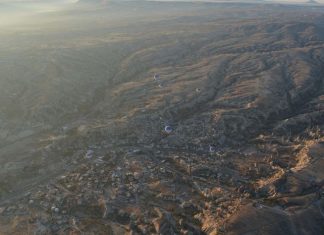The king of Gharnata at the time of my visit was Sultan Abu’l-Hajjaj Yusuf. I did not meet him on account of an illness from which he was suffering, but the noble, pious, and virtuous woman, his mother, sent me some gold dinars, of which I made good use. I met at Gharnata a number of its distinguished scholars and the principal Shaykh, who is also the superior of the Sufi orders.
I spent some days with him in his hermitage outside Gharnata. He showed me the greatest honour and went with me to visit the hospice, famed for its sanctity, known as the Outpost of al-Uqab [the Eagle]. Al-Uqab is a hill overlooking the environs of Gharnita, about eight miles from the city and close by the ruined city of al-Bira.
There is also at Gharnita a company of Persian darwishes [dervishes], who have made their homes there because of its resemblance to their native lands. One is from Samarqand [Samarkand], another from Tabriz, a third from Quniya [Konia], one from Khurasan, two from India, and so on.
Ibn Battuta leaves Andalusia and returns to Morocco
On leaving Gharnita I travelled back through al-Hamma, Ballash, and Malaqa, to the castle of Dhakwan, which is a fine fortress with abundant water, trees, and fruits. From there I went to Ronda and on to Gibraltar, where I embarked on the ship by which I had crossed before, and which belonged to the people of Asili [Arzila].
Ibn Battuta briefly describes the city of Marrakesh
It is one of the most beautiful of cities, spaciously built and extending over a wide area, with abundant supplies. It contains magnificent mosques, such as its principal mosque, known as the Mosque of the Kutubiyin [the Booksellers]. There is a marvellously tall minaret there; I climbed it and obtained a view of the whole town from it.
The town is now largely in ruins, so that I could compare it only to Baghdad, though the bazaars in Baghdad are finer. At Marrakush [Marrakesh] too there is a splendid college, distinguished by its fine site and solid construction; it was built by our master the Commander of the Faithful, Abu’l-Hasan [the late sultan of Morocco].
After returning to Fez, in 1352 Ibn Battuta crosses the Sahara and makes a tour of the kingdom of Mali, including the city of Timbuktoo.
Read More about Ibn Battuta part 9








